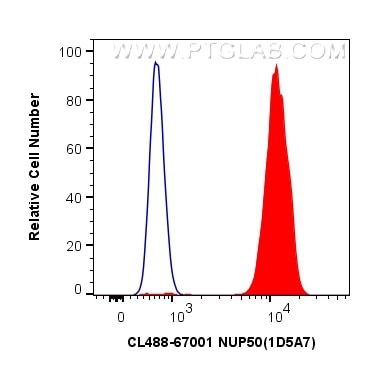Tested Applications
| Positive FC (Intra) detected in | HL-60 cells |
Recommended dilution
| Application | Dilution |
|---|---|
| Flow Cytometry (FC) (INTRA) | FC (INTRA) : 0.40 ug per 10^6 cells in a 100 µl suspension |
| It is recommended that this reagent should be titrated in each testing system to obtain optimal results. | |
| Sample-dependent, Check data in validation data gallery. | |
Product Information
CL488-67001 targets NUP50 in FC (Intra) applications and shows reactivity with Human samples.
| Tested Reactivity | Human |
| Host / Isotype | Mouse / IgG1 |
| Class | Monoclonal |
| Type | Antibody |
| Immunogen | NUP50 fusion protein Ag15144 Predict reactive species |
| Full Name | nucleoporin 50kDa |
| Calculated Molecular Weight | 468 aa, 50 kDa |
| Observed Molecular Weight | 50-55 kDa |
| GenBank Accession Number | BC028125 |
| Gene Symbol | NUP50 |
| Gene ID (NCBI) | 10762 |
| RRID | AB_3084296 |
| Conjugate | CoraLite® Plus 488 Fluorescent Dye |
| Excitation/Emission Maxima Wavelengths | 493 nm / 522 nm |
| Form | Liquid |
| Purification Method | Protein G purification |
| UNIPROT ID | Q9UKX7 |
| Storage Buffer | PBS with 50% glycerol, 0.05% Proclin300, 0.5% BSA , pH 7.3 |
| Storage Conditions | Store at -20°C. Avoid exposure to light. Stable for one year after shipment. Aliquoting is unnecessary for -20oC storage. |
Background Information
Nup50 (also known as Npap60) is a nucleoporin that binds directly to importin α and their interaction plays an important role in nuclear import. Nup50 is a mobile nucleoporin localized primarily in the nuclear basket of the nuclear pore complex (NPC) and in the nucleoplasm. Human Nup50 has two isoforms: Npap60L (1-469 aa), and its alternatively spliced isoform, Npap60S (29-469 aa) of Npap60L.
Protocols
| Product Specific Protocols | |
|---|---|
| FC protocol for CL Plus 488 NUP50 antibody CL488-67001 | Download protocol |
| Standard Protocols | |
|---|---|
| Click here to view our Standard Protocols |



